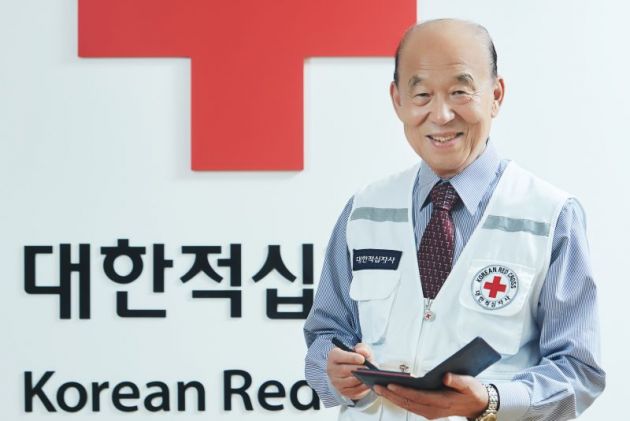Korean Red Cross president works on humanitarian impact of divided country

The 78-year-old sociology professor recently inaugurated as President of South Korea's Red Cross had his first contacts with the divided North while working at the World Council of Churches in Geneva.
Kyung-seo Park, a chair professor at Dongguk University, is now serving a three-year term after his position was approved by South Korean President Moon Jae-in and he was inaugurated on 18 August.
He worked for the WCC for more than 17 years in the 180s and 1990s until 1999.
Park spoke of his commitment in an interview with the WCC to reestablishing interactions with the Red Cross in North Korea and restarting contacts between families between North and South that have stopped for the past 10 years.
When Park was born, on the cusp of the Second World War, the Korean Peninsula was united, but under Japanese occupation.
He studied at Seoul National University and then completed an MA and a PhD at Germany's University of Göttingen in the early 1990s.
SEPARATION OF KOREA
Korea separated into North and South in the bitter civil war that killed millions, displacing even more, and separated many families in the early 1950s. A peace treaty has never been signed and the halt in hostilities only has an armistice agreement.
"We will continue to restart the kind of contact between Korean Red Cross and DPRK (Democratic People's Republic of Korea) as well," said Park in his interview, noting, "I had been working during my time in the WCC with the people of North Korea when they were suffering.
"So, I feel can utilize to the maximum my human network in North Korea, and will try to reopen a special channel through which we can contact and communicate on various issues and one of those will be so that can have family reunions with specific people."
"During my time in the WCC, I had really good cooperation with the North Korean government as well as people in North Korea especially when international affairs in the WCC started with the first dialogue between the two churches [of North and South] in 1984 in Japan and again in Geneva in 1986 and in 1988."
That contact resumed again during a period of flooding in North Korea in 1995 and 1996.
"We had a good record in our dealing with North Korea and just at the time of my departure from the WCC (in September 1999) and as I was leaving ACT (Action by Churches Together) was established, helping to mobilize worldwide humanitarian support," for people suffering in North Korea, said Park.
He said he hopes ACT Alliance will restart humanitarian work with Korea.
ENCOUNTERS WITH RED CROSS WHILE AT WCC
Park had his first encounter with the Red Cross February 1982 when he was working as director of the Asia region at the WCC, while he was in Geneva, which he regards as a second home.
The WCC is located within a 5-minute walking distance from the headquarters of the International Committee of the Red Cross in Geneva.
"At that time, I read 'A Memory of Solferino' written by Jean Henry Dunant, the founder of Red Cross. This gave me the fundamental and profound questions about life itself such as what the meaning of life is and what I should live for," said Park in his inaugural speech.
"Having the lessons from this book in my mind, during my tenure at the WCC for 20 years, I visited many different places affected by famines and conflicts and where human dignity was trampled."
Park said he was able to coordinate humanitarian aid for those who suffered.
"In particular, I witnessed the power of humanity by supporting those in need in Democratic People's Republic of Korea and people affected by conflicts and situations of violence in Rwanda, Sri Lanka and Myanmar in cooperation with the International Federation of Red Cross Red Crescent Societies," he said.
Park said, "Family reunions have been stopped over past 10 years. So I will try my best to convince my counterpart in North Korea to reconvene our channels, through which we will find a way to restart apart from the political tension on the Korean Peninsula that has been taking place in these recent days."
An estimated 131,200 dispersed South Korean family members are on the waiting list for the now-suspended reunion events but the Red Cross president noted that in reality about 60,000, or more than 50 percent of them are aged more than 80 years.
"So, time is running out and the issue of war-separated families should be resolved on humanitarian grounds as a top priority and I am studying how best to deal with it," Park said.
MANY VISITS TO NORTH KOREA
He has visited North Korea 28 times since the 1980s and he has personally met its former leaders, the late Kim Il Sung and Kim Jong Il.
Most recently he was in North Korea for eight days in October 2015 and he was able to closely look into the lives of people there and have conversations with the various people.
"The situation in North Korea has been much improved as regards the daily life, personal incomes and living standards from when I first went there. When I visited two-and-a-half years with [the WCC's] Peter Prove, we had two meetings with the UN at the time and the UN staff working in North Korea said the situation has improved."
Park said that his experiences have "convinced me that two Koreas will be unified as one single family in the end although Republic of Korea and Democratic People's Republic of Korea are divided in two now because of different ideology and governance system.
"I believe that dialogue between the two Koreas in a humanitarian spirit, are instrumental in getting over the situation of division and facilitating inter-Korean cooperation."